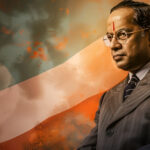Subhas Chandra Bose, popularly known as Netaji, remains one of the most enigmatic and controversial figures in Indian history. While his role in the freedom struggle is undeniable, debates continue to swirl around his mysterious disappearance, secret missions, and his true legacy. Was he merely a nationalist hero, or does history hide a deeper legend?
Who Was Subhas Chandra Bose?
Subhas Chandra Bose was a revolutionary Indian freedom fighter who believed in armed struggle over passive resistance. Unlike Mahatma Gandhi, Bose was convinced that India’s independence could only be won through force. He famously declared:
“Give me blood, and I will give you freedom!”
Bose’s bold leadership and formation of the Indian National Army (INA) to fight British rule earned him both admiration and controversy.
The Azad Hind Government and INA: A Bold Dream
In 1943, Bose established the Provisional Government of Free India (Azad Hind) in Japanese-occupied Singapore. With the help of Axis powers during World War II, he sought to liberate India militarily.
His Indian National Army, composed of Indian POWs and expatriates, marched with Japanese troops to India’s borders. Though ultimately unsuccessful, Bose’s efforts inspired a generation of revolutionaries and struck fear into the British Empire.
The Disappearance: Death or Disguise?
One of the greatest mysteries in Indian history is Bose’s alleged death in a plane crash in Taiwan on August 18, 1945. However, no official record of his body was ever found, fueling countless theories:
-
Soviet Connection Theory: Some believe Bose escaped to the Soviet Union under Stalin’s protection and lived secretly.
-
The Gumnami Baba Theory: A mysterious saint in Faizabad, Uttar Pradesh, was believed by many to be Netaji living incognito until his death in 1985.
-
Japanese Conspiracy: Others claim the plane crash was staged with Japanese help to allow Bose to disappear and avoid Allied pursuit.
These theories have led to multiple government-led investigations in India, but none have definitively solved the riddle.
Bose vs Gandhi & Nehru: A Forgotten Rivalry?
While Gandhi and Nehru are household names, Bose’s contributions are often overshadowed. His radical views and conflict with the Congress leadership led to his resignation as Congress President in 1939. Yet, he remained immensely popular with the youth and Indian soldiers.
Many believe that post-independence India deliberately sidelined Bose’s legacy to promote a non-violent narrative of freedom.
Why Subhas Chandra Bose Still Matters
Today, Bose represents:
-
Defiance against oppression
-
Courage in the face of impossible odds
-
Patriotism with action
His story is a reminder that the path to freedom wasn’t singular. It was complex, layered, and at times, dangerous. Whether or not the mystery of his disappearance is ever solved, his legend continues to inspire millions.









